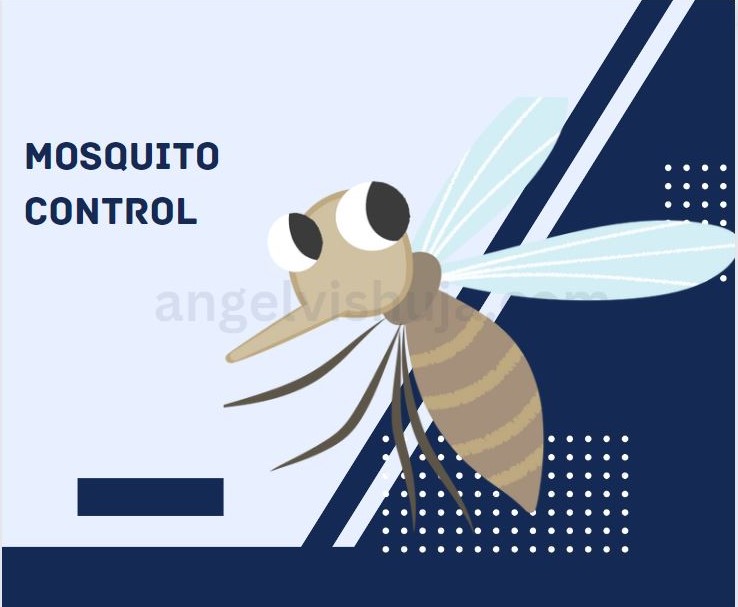Mosquito Control
Mosquito control is essential for public health and comfort because mosquitoes can transmit diseases such as malaria, dengue fever, Zika virus, and West Nile virus. Here are some common methods for mosquito control:
Source Reduction:
Eliminate or reduce standing water where mosquitoes breed. This includes emptying containers, cleaning gutters, and properly maintaining swimming pools.
Use mosquito-proof containers or treat standing water with larvicides to kill mosquito larvae.
Biological Control:
Introduce natural predators like fish, dragonflies, and copepods into bodies of water to feed on mosquito larvae.
Bacterial larvicides like Bacillus thuringiensis israelensis (Bti) can be used in water sources to kill mosquito larvae without harming other organisms.
Chemical Control:
Insecticides can be used to control adult mosquitoes. This can be done through fogging, spraying, or treating surfaces where mosquitoes rest.
The use of insecticide-treated bed nets and clothing can help protect individuals from mosquito bites.
Genetic Control:
Genetic modification techniques such as releasing mosquitoes with modified genes that either sterilize them or reduce their ability to transmit diseases have been explored.
Community Involvement:
Public education and community involvement are crucial for effective mosquito control. Communities can implement and maintain source reduction practices and report mosquito breeding sites.
Personal Protection:
Use of mosquito repellents on exposed skin.
Wearing long-sleeved shirts and long pants, especially during peak mosquito activity times (dawn and dusk).
Installing and maintaining screens on windows and doors.
Surveillance:
Regular monitoring of mosquito populations, especially in areas with a high risk of disease transmission.
Surveillance for disease cases to identify and respond to outbreaks quickly.
Integrated Mosquito Management (IMM):
IMM involves a combination of various control methods tailored to the specific needs and conditions of an area. It emphasizes a comprehensive and sustainable approach to mosquito control.
It’s important to note that while controlling mosquito populations is crucial, it should be done in an environmentally responsible manner to minimize harm to non-target species and ecosystems. Additionally, the choice of control methods may vary based on the specific species of mosquitoes and the diseases they may transmit in a particular region.
What is the best method for mosquito control?
The best method for mosquito control often involves an integrated approach that combines multiple strategies. Here are some key components of an effective mosquito control program:
Source Reduction:
Eliminate or reduce standing water where mosquitoes breed. This is a critical step in preventing the development of mosquito larvae.
Biological Control:
Introduce natural predators like fish, dragonflies, and copepods into mosquito breeding habitats to control larvae populations.
Chemical Control:
Use insecticides judiciously and selectively. This may involve treating mosquito breeding sites with larvicides and using adulticides only when necessary.
Employ environmentally friendly and targeted insecticides to minimize harm to non-target species.
Personal Protection:
Encourage the use of personal protective measures such as mosquito repellents, bed nets, and appropriate clothing to prevent mosquito bites.
Community Involvement:
Raise awareness within communities about the importance of mosquito control.
Engage communities in source reduction activities and encourage reporting of mosquito breeding sites.
Surveillance:
Regularly monitor mosquito populations to assess the effectiveness of control measures.
Implement disease surveillance to detect and respond to potential disease outbreaks
What is the best way to kill mosquitoes?
Killing mosquitoes can be approached through various methods, depending on the situation and your preferences. Here are some effective ways to get rid of mosquitoes.
Insecticides:
Indoor Sprays: Use insecticide sprays or aerosols specifically designed for indoor use to kill mosquitoes within the home.
Outdoor Fogging: Insecticide fogging can be employed outdoors to reduce adult mosquito populations.
Mosquito Nets:
Use insect repellent bed nets to avoid mosquito bites while you sleep. This is especially important in areas where mosquito-borne diseases are prevalent.
Electric Mosquito Zappers:
Electronic insect zappers use ultraviolet light to attract mosquitoes, and an electric grid or fan to kill or capture them. These are effective for indoor use.
Mosquito Traps:
Mosquito traps emit carbon dioxide, heat, and sometimes use attractants to lure mosquitoes. Once attracted, the mosquitoes are trapped and killed.
Mosquito Larvicides:
Use larvicides in standing water to kill mosquito larvae before they develop into adults. Bacillus thuringiensis israelensis (Bti) is a common larvicide that is effective and environmentally friendly.
Natural Repellents:
Essential oils like citronella, eucalyptus, and tea tree oil can act as natural mosquito repellents. Using these oils in candles or diffusers can help keep mosquitoes away.
DIY Mosquito Traps:
Create simple traps using household items, such as a mixture of sugar and yeast to produce carbon dioxide, attracting mosquitoes to a container from which they can’t escape.
Insecticide-Treated Clothing:
Wear clothing treated with insecticides to repel mosquitoes when spending time outdoors.
Mosquito Coils and Incense:
Mosquito coils and incense contain insecticidal compounds that repel and kill mosquitoes. These can be used indoors or in outdoor spaces.
Biological Control:
Introduce natural predators like dragonflies, bats, or certain fish species that feed on mosquitoes.
It’s important to note that while killing mosquitoes is one aspect of control, integrated mosquito management approaches, including source reduction and preventive measures, are often more sustainable and contribute to long-term mosquito control. Additionally, using insecticides should be done responsibly, taking care to follow product instructions and considering the potential environmental impact.
What is the effective control of mosquito?
Effective mosquito control involves a multifaceted, integrated approach that targets different stages of the mosquito life cycle and considers the specific characteristics of the local environment. Here are key components of effective mosquito control:
Source Reduction:
Identify and eliminate or manage mosquito breeding sites. This includes removing standing water from containers, cleaning gutters, and ensuring proper drainage.
Encourage community participation in source reduction efforts.
Biological Control:
Introduce natural predators, such as fish, dragonflies, and copepods, to bodies of water to feed on mosquito larvae.
Use biological larvicides, such as Bacillus thuringiensis israelensis (Bti), which specifically target mosquito larvae.
Chemical Control:
Use insecticides judiciously and according to local regulations. Target mosquito larvae in breeding sites and adult mosquitoes when necessary.
Choose environmentally friendly and targeted insecticides to minimize harm to non-target species.
Personal Protection:
Promote the use of personal protective measures, including mosquito repellents, bed nets, and appropriate clothing.
Educate the community on the importance of personal protection, especially during peak mosquito activity times.
Community Engagement:
Raise awareness about the importance of mosquito control and the risks associated with mosquito-borne diseases.
Involve communities in mosquito surveillance and reporting of breeding sites.
Surveillance:
Regularly monitor mosquito populations to assess the effectiveness of control measures.
Implement disease surveillance to detect and respond to potential disease outbreaks.
Integrated Mosquito Management (IMM):
Implement an integrated approach that combines various control methods based on the specific characteristics of the mosquito species and the local environment.
Research and Innovation:
Support ongoing research to develop new and more effective mosquito control methods.
Explore innovative technologies, such as genetic control strategies and new insecticides, to enhance control efforts.
Regulatory Measures:
Enforce and strengthen regulations related to mosquito control, including the use of insecticides and the maintenance of public spaces.
International Collaboration:
Collaborate with neighboring regions and countries to address mosquito-borne diseases on a broader scale, especially in the case of diseases that can cross borders.
Remember that the effectiveness of mosquito control measures may vary depending on the local context, mosquito species, and the prevalence of mosquito-borne diseases in a particular region. Regular monitoring and adaptation of control strategies are essential to address changing conditions and emerging challenges.
























